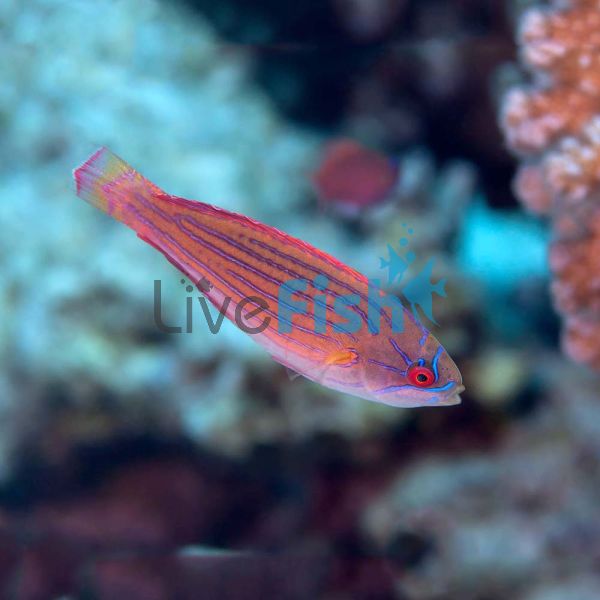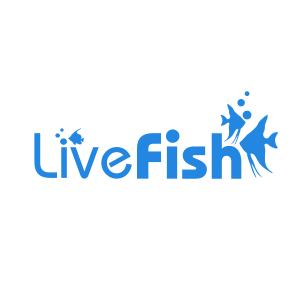Eight Line Wrasse - Medium
The Eight-Line Wrasse is one of the biggest lined wrasses. It has plenty of character and a boisterous personality!
Eight Line Wrasse
The Eight Line Wrasse is a lively and appealing fish. The name comes from the eight horizontal thin red stripes on its body. The colour patterns of the Eight-Lined Wrasses are quite varied. Some have a yellowish to the orange body while others have a pink to reddish body. The head and mouth are pointed to help it feed on reef invertebrates and its fins and tail are detailed. Adult Eight-Lined Wrasses can grow to be up to 5.5 inches long (14 cm).
The Eight-Line Wrasse appears to have a clear relationship between size and sex. Males are usually the biggest, and females are slightly smaller. Breeding information is limited and there are no reports of breeding in captivity. This species is hermaphroditic and has the ability to switch from female to male.
The distribution of the Eight-Line Wrasse is across the Indo-West Pacific. Western Indian Ocean locations include the Comoros and Seychelles. Pacific regions take in Hawaii and Ducie Island, Japan, and New Caledonia. It is a benthopelagic species found on seaward reefs. It lives among rubble or live corals, preferring caves and crevices. Eight Line Wrasse can be spotted at depths of at least 40 meters (130 ft).
Tank Recommendations for your Eight Line Wrasse
At least a 30-gallon (113.5 liters) aquarium is required for this species.
This species can be housed in a reef tank, but caution is advised. It is safe with corals but will eat small crustaceans, as well as urchins & bristle worms. A suitable aquarium should have plenty of rocks to hide amongst and live rock to graze on.
The Eight-Lined Wrasse is a diurnal fish, meaning it is active during the day and sleeps at night. They sleep in a mucus cocoon which (luckily) doesn't appear to affect the water quality. The cocoon shields them from predators by concealing their scent as they sleep.
Suitable Tank Buddies
The Eight-Line Wrasse is hostile with other Wrasses and should be the only one in an aquarium.
It will thrive in the presence of larger fish that can defend themselves. It should be introduced first if it is to be kept in an aggressive community tank.
Usually Compatible
The most suitable tank buddies are semi-aggressive or larger, less aggressive species. Pufferfish, Tangs, Butterflyfish, Angelfish, Goatfish, Surgeonfish, and Filefish are all good options.
Sometime Compatible
Care should be taken with species such as Hawkfish, larger Dottybacks, and Triggerfish. These species could pick on the Wrasse and, as a result, may not be good tank mates.
Rarely Compatible
Avoid Shrimp, small Urchins, gastropods, and Crabs as they will be eaten. Smaller fish like Gobies, Seahorses, and Flasher or Fairy Wrasses will be harassed. Large predators such as Groupers and Lionfish will eat your Eight Line Wrasse.
Feeding your Eight Line Wrasse
The Nightline Wrasse is a carnivore. Small crustaceans should be the mainstay of a diet rich in protein meals, formulae, and flakes. Live rock is also beneficial for them. It contains copepods, amphipods, and other micro-organisms the Wrasse can feed on. They need to be fed at least twice a day.
| Scientific Name | Pseudocheilinus octotaenia |
|---|---|
| Care Level | Moderate |
| Common Names | Eightline Wrasse, Eight Lined Wrasse, Eight Striped Wrasse |
| Diet | Carnivore |
| Fish Family | Labridae |
| Lifespan (years) | 7 |
| Max. Length (cm) | 14 |
| Min. Tank Volume (l) | 114 |
| Origin | Indo-West Pacific; Comoros, Seychelles, Hawaii, Ducie Island, Japan, New Caledonia |
| Reef Safe | With Caution |
| Sociability | Aggressive |
| Venomous | No |
| Water Conditions | 1.020-1.025, 72-78° F, dKH 8-12, pH 8.1-8.4 |




